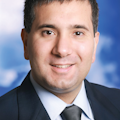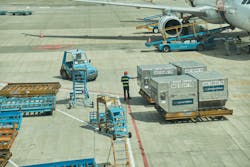The International Air Cargo Association (TIACA) has launched the BlueSky program as a sustainability assessment, validation and verification scheme to enable companies to track their sustainability progress, benchmark against peers and accelerate the industry’s transformation.
According to Glyn Hughes, director general of TIACA, sustainability – as defined by the 17 United Nations Sustainable Development Goals – encompasses a whole series of topics which center around people, the planet and the need for enhanced global prosperity.
“As individuals and as companies, we should all be doing what we can to make a positive impact in these areas. We owe it to the planet and to the future generations,” he affirms. “TIACA's BlueSky program, launched in Q4 2022, is the industry’s first comprehensive evidenced-based independent assessment program designed to provide each organization with a personalized dashboard highlighting where they are in terms of sustainability actions.”
Martin Drew, senior vice president of global sales and cargo at Etihad Airways, points out that the BlueSky program aims to enhance sustainability in air cargo by providing a common vision, transparency and a mechanism to demonstrate how businesses can grow responsibly as well as gain an improved image of the air cargo industry.
“We became the first Middle Eastern airline to join TIACA’s BlueSky sustainability verification program in 2022 as it complemented the initiatives the Etihad leadership team has been focusing on,” he says. “The main requirements discussed on our initial call with TIACA were to be transparent in responding to a set of questions, which would then be followed by a thorough assessment by the team to understand where we stand against peers in the industry and also how we could contribute to shaping the BlueSky program.”
Swissport is also a launching partner of the BlueSky program.
“We really wanted to play our part in the TIACA initiative from the start and are proud to be one of the pioneers,” says Nadia Kaddouri, chief strategy and sustainability officer at Swissport. “As the global market leader in airport ground services and air cargo services, we are committed to making a more sustainable aviation future a reality.”
Swissport has relied on sustainable technologies in its air cargo business, and it invests in sustainable business solutions.
For example, in Frankfurt and Vienna, the company uses solar power generated by photovoltaic systems on the roofs of its new air cargo centers. Also, in Vienna, an electrically powered truck has been in use since May 2022, transporting freight shipments between the Swissport cargo center in Fischamend and Vienna airport with zero emissions, the company affirms.
Program Requirements
The journey to sustainable transformation is different for every company. BlueSky is not a pass or fail program, but rather an assessment program showing where a company is compared to industry best practices, points out Hughes.
“A dashboard will help organizations understand what they are doing well and will highlight where they perhaps need to do more. The assessment covers decarbonization, waste management, biodiversity protection, local economy and community support, improvement of lives and well-being, efficiencies and profitability, how a company attracts, retains and develops employees and how they build and nurture partnerships,” he says. “The assessment is based on evidence submitted, provides a comprehensive analysis, and is confidential to the participants for them to use as they identify best.”
How the Need for the Program Developed
The air cargo sector has historically been considered less sustainable than other methods of transportation. Over the past few years, the sector has been making great strides in developing more sustainable solutions and is investing in fleet modernization, fuel efficiency, sustainable aviation fuel (SAF) and carbon compensation initiatives, observes Drew.
“The BlueSky program was developed in response to the need to find a common platform that our industry can benchmark against. The platform presented Etihad Cargo, and fellow peers in the industry, with a tool to measure the effectiveness of its initiatives combined with the environmental impact of its operations, helping us to identify areas for improvement,” he says. “All that was required to get the process started was ensuring the required data for input into the tool was available and that adequate time and resources were allocated to complete the desktop verification process.”
TIACA conducts an annual industry sustainability survey, and it was increasingly receiving feedback about the need for an independent program to help companies start their sustainability journey and to measure where they are, affirms Hughes.
“This then gave rise to the development of the Blue Sky program as a support tool for the entire industry as questions are tailored to whichever sector of the industry the participant represents,” he says. “We launched in October 2022 with 10 initial participants and since the launch several more have signed up with over 40 others assessing their participation.”
Sustainability can and will be a game changer in the air cargo industry, according to Drew.
“If we look at the figures, it is staggering that the world’s aviation sector is currently responsible for 2.5 to 3 percent of all human-induced carbon dioxide emissions worldwide, and this could increase to up to 22 percent of global emissions by 2050,” he says. “As other sectors decarbonize more quickly, it is critical for the global air cargo community to take action now to invest in more sustainable solutions.”
The impact of initiatives and product enhancements can be measured and tracked within the BlueSky program, in combination with other sustainability data, Drew points out.
“The program is open to participants across the entire air cargo sector, including airlines and carriers, airports, ground handlers and general sales and service agents,” he says.
How the Program Works
The BlueSky program has been launched in phases, and Etihad Cargo’s initial participation involved a self-assessment using assessment guidelines provided by TIACA.
“This first tier provided a way to begin the verification and validation process through awareness and self-assessment,” says Drew. “The second tier of the BlueSky program leads into the desktop verification, beginning with an online assessment and verification of the documents that have been provided. A performance score will be given across each area and will be visible via the company’s dashboard. In this evidence-based desktop verification process, what is assessed is progress against eight critical sustainability criteria.”
Upon completion of the tailored assessment process, a carrier will receive a personalized dashboard that displays the carrier’s performance against the criteria, explains Drew.
“The assessment process has enabled us to more effectively measure our performance and track our sustainability progress as we continue on our sustainability journey, which will benefit our customers and the wider air cargo industry,” he says.
The third and final tier includes further desktop verification and an onsite independent audit, explains Drew.
“In addition to the performance score for each area given in the second tier, an enhanced company dashboard also gives access to excellence badges and a detailed report with recommendations on how participants can become more sustainable,” he affirms. “The first tier of the program is available to all, and assessment guidelines are provided upon request or can be downloaded via the program website. The desktop verification and onsite audit tiers both offer a two-year renewable assessment.”
BlueSky assesses where a company currently is on its journey to a more sustainable future so there is no minimum requirement to commence the assessment, affirms Hughes.
“The key is to answer the questionnaire and provide as much fact-based evidence to support the positions. The program also provides guidance as to where an activity may be being performed but there is not sufficient evidence or inclusion in procedures to ensure the activity continues consistently,” he says. “We would recommend all organizations download the free assessment guidelines which then provide more information as to the areas covered by the assessment.”
TIACA is also holding community-based information sessions to present further guidance to the industry.
“As to renewal, we would recommend that each organization allow a reasonable time between assessments, so they make tangible strides forward on the areas highlighted,” Hughes says. “We suggest every two years, although some companies have indicated they want to make significant improvements immediately so will be pursuing annual reviews.”
About the Author

Mario Pierobon
Dr. Mario Pierobon provides solutions in the areas of documentation, training and consulting to organizations operating in safety-sensitive industries. He has conducted a doctoral research project investigating aircraft ground handling safety. He may be reached at [email protected].
